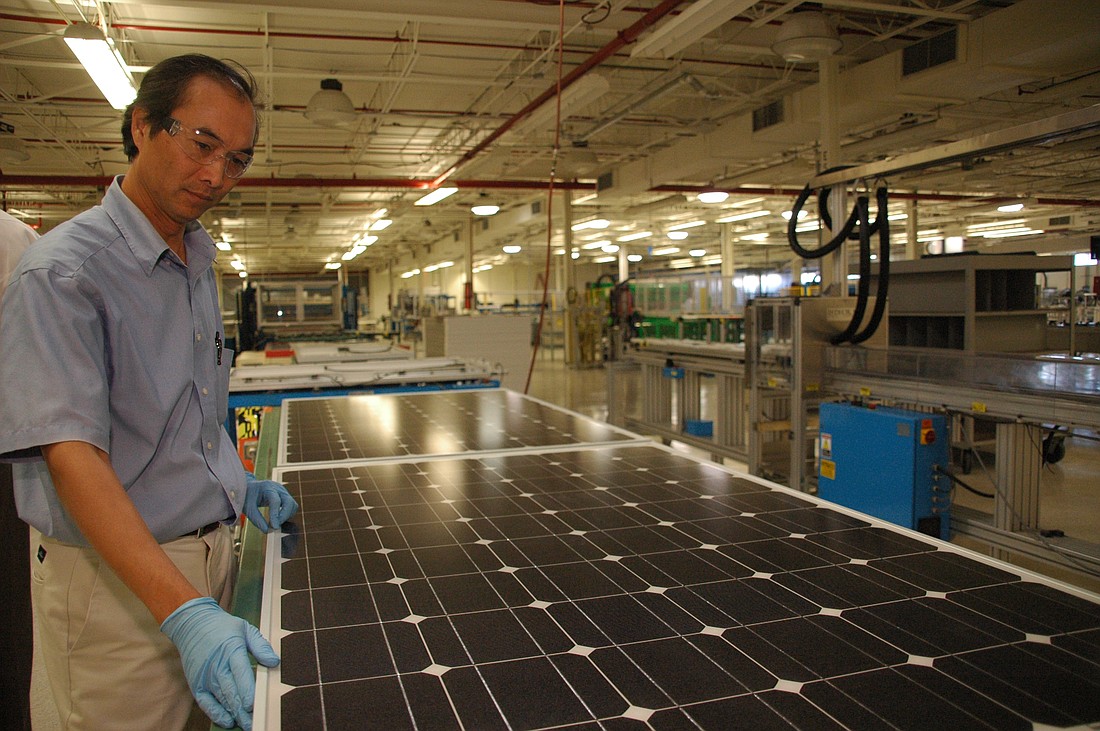- July 26, 2024
-
-
Loading

Loading

Solar may be the energy of the future, but some question the brightness of its future here in the Sunshine State.
The solar energy industry took a hit this summer when the Florida Solar Energy System Incentives Program ended on June 30. This four-year program, enacted in 2006, boosted the solar energy industry by offering consumers monetary rebates after installing a solar system of $4 per watt based on the total wattage rating of the system purchased.
No further legislation has been passed, and this has left many Central Florida solar companies scrambling.
“Across the country, we’re doing well,” said Tod Ellington of Altamonte Springs-based solar energy company UMA Solar. “But in Florida and in Central Florida, there’s hardly any incentives out there for consumers and homeowners to be able to incorporate solar as cost effectively as it should be.”
Since the incentive program ended, Ellington said, he has progressively watched the company’s business in Central Florida dwindle. The interest in solar energy options among citizens, however, is still there.
“I think the Central Florida community would be very interested in incorporating solar — we have a lot of inquiries but most people are just sitting waiting for the state of Florida to come up with programs that are going to help them like many states across the country are,” Ellington said.
Alex Mack, a representative for the Florida Energy Climate Commission operating under Gov. Charlie Crist’s “Serve to Preserve” initiative, said there is currently no legislation in the works to reinstate the program. The commission’s website states in bold print that as of May 3 this year, funding for the solar rebate program is no longer available.
Program backlogged
Mack said that according to the legislation, customers that had a solar system installed before the June 30 deadline have 120 days after the program ended to apply for the rebate — meaning until the end of this month. However, Mack said the most recently published numbers indicate that the program is still backlogged, owing applicants about $54 million. Some $13.9 million of that amount has been set aside and is awaiting legislative approval to be dispersed.
Patrick Robinson, an engineer with the Florida Solar Energy Center located in Cocoa Beach, agrees that the lack of incentive-related legislation in the state is the largest factor holding the solar energy market back in Florida.
Some strides have been made such as the solar system installed on the roof of the Orlando Convention Center and another solar farm at the Kennedy Space Center. The largest system in the state, the DeSoto Next Generation Solar Energy Center in Arcadia, has the capability to supply power to more than 3,000 homes.
“State energy rebates on hold or funding has exhausted are some of the main problems facing Florida homeowners who are trying to have their homes become more energy efficient,” Robinson said.
The future
In order to keep business afloat, other local companies such as Lake Mary-headquartered BlueChip Energy are doing all they can to generate business. For them, this means making solar energy as affordable as possible.
To do this, in the past year, they’ve gone from a solely solar manufacturing company to adopting methods to become a “solar value chain”, providing everything from sales to manufacturing to installation.
Lawrence Hefler, director of corporate marketing for BlueChip, said the company has also used a manufacturer’s rebate and a lease-to-own option to help customers finance their solar systems.
“We’re able to keep our costs competitive because we’re a manufacturer of solar panels … we manage the cost and we manage the process, so it becomes a lot more appealing to people because you’re basically buying directly from the factory,” Hefler said.
He said so far this year, BlueChip has installed 55 solar energy systems, about 80 percent of them in residential properties. He’s optimistic that business will only continue to get better in the future.
“I like to say that the future is bright,” he said. “We’re in the Sunshine State, it’s a renewable energy resource and there’s a demand for alternative energy … This is a long-term solution for dealing with rising energy costs and the environmental impact of standard forms of energy we’ve been using all along.”